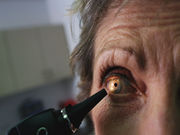More effective than conventional optometric low vision services for age-related macular degeneration
MONDAY, March 20, 2017 (HealthDay News) — Behavioral activation (BA) plus low vision rehabilitation with an occupational therapist (OT-LVR) is more effective than conventional low vision optometry services for patients with age-related macular degeneration (AMD), according to a study published in the March issue of Investigative Ophthalmology & Visual Science.
Ashley D. Deemer, O.D., from the Johns Hopkins University School of Medicine in Baltimore, and colleagues conducted a randomized clinical trial involving 188 AMD patients with subsyndromal depressive symptoms. Participants had two outpatient low vision rehabilitation optometry visits and were randomly allocated to in-home BA + OT-LVR, which aimed to increase adaptive behaviors and achieve valued goals, or supportive therapy (ST), which is a nondirective, psychological treatment that provides emotional support. The active inventory was used to assess functional vision at baseline and four months in terms of goals and corresponding tasks.
The researchers found that both the BA + OT-LVR and ST groups had improvement in functional vision measures at the goal level. Compared with ST patients, BA + OT-LVR patients showed more improvement in reading, inside-the-home tasks, and outside-the-home tasks, at the task level. Subjects with a visual acuity of ≥20/70 had the greatest effects in the BA + OT-LVR group.
“BA + OT-LVR services, provided by an OT in the patient’s home following conventional low vision optometry services, are more effective than conventional optometric low vision services alone for those with mild visual impairment,” the authors write.
Copyright © 2017 HealthDay. All rights reserved.








